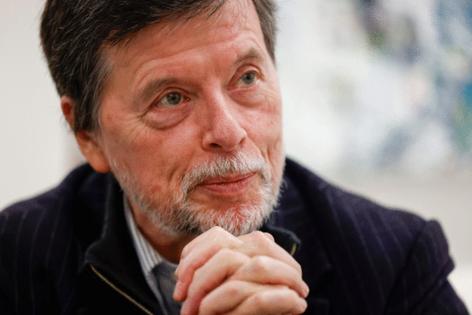Ken Burns on new documentary: 'We hope to put the "us" back into the United States'
Published in Entertainment News
FORT WORTH, Texas — It’s been 250 years since the start of the American Revolution, and the extent to which our nation has matured into a continent-spanning world power has, no doubt, exceeded the founding fathers’ wildest dreams.
But that’s not to say they’d be altogether pleased with what we’ve become, at least not according to acclaimed documentary filmmaker Ken Burns.
‘The American Revolution’
On June 3, Burns was in Dallas with co-director Sarah Botstein to preview his latest offering, “The American Revolution,” a six-part, 12-hour epic examination of our fight for independence from Britain, which Burns believes is the most significant historical event since the birth of Jesus Christ.
The Americans’ victory, and, more important, the victory of democratic ideals, upended the old monarchical world order. In that way, Burns said after the preview screening at the Winspear Opera House, the revolution “kicked open the door” for equality not only for the wealthy elites who signed the Declaration of Independence but also for those on society’s fringes, though in some cases it took time to achieve that equality.
Author and historian Jane Kamensky, who appears throughout “The American Revolution,” was alongside Burns in Dallas. She said the beauty of the revolution is that it reinforced the belief that we are citizens, not subjects.
“Monarchy is about looking up,” said Kamensky. “Democracy is about looking sideways.”
In that respect, though, Rick Atkinson, another author and historian featured in the series, said our colonial forebears would be “shaking their heads” if they saw us today and saw the way we’ve reverted to elevating political demagogues on pedestals.
While Burns said he didn’t intend to make a statement with “The American Revolution,” he agreed with Atkinson, saying we as a nation have taken a step backward toward “superstitious peasantry” in recent years.
If there’s anything Burns hopes viewers will take away from the documentary when it premieres this fall, it’s the idea that Americans should once again walk shoulder to shoulder into the future and remember that no single person should stand above any other.
“We hope to put the ‘us’ back into the United States,” Burns said of the film’s purpose, beyond presenting an accurate picture of what America and Americans were like in the revolutionary period.
Shattering US mythology
Besides the thesis that the revolution was as important as the birth of Christ, the documentary was also constructed on the premise that what we think we know about the Revolutionary War is largely limited to narrow perspectives and clouded by myth.
With “The American Revolution,” Burns and his collaborators attempted to set the record straight by presenting a complete and fully nuanced look at the event.
You see that at the beginning of the first episode. Even before figures like George Washington, Thomas Jefferson and Benjamin Franklin make an appearance, viewers hear from Canassatego, who was a spokesman for the confederation of Iroquois tribes years before the notion of colonial independence took hold.
Elsewhere in the series, Joseph Plumb Martin, a 15-year-old militiaman from Connecticut, is a focal character. These are people, as Kamensky put it, who never ended up as marble statues but who nonetheless played a critical role in establishing a new nation.
It took Burns, his co-producers and production staff 10 years to compile all the material, film the re-enactment scenes and sift through the sands of time for heretofore unrecognized characters.
As for the “bold-faced names,” as Burns put it, there was an effort to present them as real people, not idealized heroes.
George Washington, for example, was a gifted leader, said Atkinson, but he was a terrible military tactician, suffering humiliating defeats before his victory at Yorktown, the battle that effectively ended the war in the Americans’ favor. And those deficiencies are examined in “The American Revolution.”
“For all his virtues, it’s important to understand his defeats, which make him so much more interesting,” Atkinson said of Washington’s portrayal.
Botstein agreed, saying people’s flaws make them relatable. Perhaps, she said, up-and-coming American heroes will see that and realize that it’s possible to mimic, at least in some ways, these imperfect icons.
The series ends with a poignant line: “The American war is over; the American Revolution is not.”
It’s that grace note that will likely resonate with viewers long after they’ve finished the final episode. The message seems to be that the United States is and always has been a work in progress. It’s a beacon of democracy, yes. But that is predicated on a desire to fight for what we believe in, Burns reminded his audience during the panel discussion.
America is, as Burns said, quoting Benjamin Franklin, “A republic, if you can keep it.”
———
“The American Revolution” premieres Sunday, Nov. 16, on PBS and will air for six straight nights, concluding on Friday, Nov. 21. The full series will also be available for streaming on PBS.org and the PBS app beginning Nov. 16.
———
©2025 Fort Worth Star-Telegram. Visit star-telegram.com. Distributed by Tribune Content Agency, LLC.













Comments